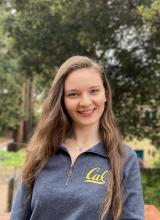MCB137/237 Spring 2022
Physical Biology of the Cell
About
Biology is being revolutionized by new experimental techniques that have made it possible to quantitatively query the inner workings of molecules, cells and multicellular organisms in ways that were previously unimaginable. The objective of this course is to respond to this deluge of quantitative data through quantitative models and the use of biological numeracy. The course will explore the description of a broad array of topics from modern biology using the language of physics and mathematics. One style of thinking we will emphasize imagines the kinds of simple calculations that one can do with a stick in the sand.We will draw examples from broad swaths of modern biology from our department and beyond including cell biology (signaling and regulation, cell motility), physiology (metabolism, swimming), developmental biology (patterning of body plans, how size and number of organelles and tissues are controlled), neuroscience (action potentials and ion channel gating) and evolution (population genetics) in order to develop theoretical models that make precise predictions about biological phenomena. These predictions will be tested through the hands-on analysis of experimental data and by performing numerical simulations using Python. Physical biology will be introduced as an exciting new tool to complement other approaches within biology such as genetics, genomics and structural biology. The course will introduce students to the enabling power of biological numeracy in scientific discovery and make it possible for them to use these tools in their own future research.
People
-
Hernan Garcia - Instructor

hggarcia@berkeley.edu
Office Hours:
Wednesdays 2pm - 3pm @ 505 Weill Hall, @ Zoom
-
Yasemin Kiriscioglu - GSI

ykiriscioglu@berkeley.edu
Office Hours:
Tuesdays 3 pm - 4 pm @ Zoom discussion- Fridays 1-2 pm in 2030 Valley Life Sciences
-
Dushyant (Yovan) Badal - GSI

ybadal@berkeley.edu
Office Hours:
Mondays 2 pm - 3 pm @ 235 Barker, @ Zoom discussion- Fridays 12-1 pm in 2030 Valley Life Sciences
Course Structure
The class as a whole will meet twice a week for one hour and a half - Tuesdays and Thursdays, 11am - 12:30pm. The first few lectures will be on Zoom at the address linked in the Syllabus section below, and in 219 Dwinelle once in-person classes resume. This time will be devoted to lectures, discussions and hands-on activities including Python exercises. Further, the class will be split into weekly one-hour lab sessions. During these lab sessions, students will work closely with the GSIs to implement the concepts they learned in class in the context of different biological problems. Homework assignment will be given every week and will represent 75% of the final grade. Twice during the semester, students will prepare a project. The first project will be a written assignment, while the second project will be presented in class. These projects will represent 25% of the final grade.For undergraduate students (MCB137L), the projects will consist on carrying out an estimate on a biological phenomenon of interest following the style presented in class. These presentations will be five minutes long.
For graduate students (MCB237L) the project will consist on presenting a theoretical model developed in a recent paper of their choosing to the class. These presentations will be ten minutes long.
Course Policies
Attending class and office hoursIf you miss classes, it is your responsibility to get notes from one of your classmates. You cannot expect the instructor or GSI to redo the lecture during office hours.
Being able to attend office hours are a key to success. If you cannot attend any of the three offered office hours, you might want to reconsider taking this course.
Homework assignments
Homeworks are due at the beginning of class one week after they are posted.
Homeworks should be submitted through Gradescope to the GSIs in PDF form. Any other form of homework submission will not be accepted. No late homeworks. Time management is key. Start to work on your homework assignments early and make use of office hours and our availability over Piazza.
It is important to describe your reasoning. Just writing an equation or drawing a plot does not constitute a satisfactory answer to a homework problem. All plots in the homeworks need to have labeled axes. All code used needs to be submitted through GraceScope by the homework due date. You can work in groups, but the answers should be your own. This includes the code!
Grading
Regrading is done only until a week after the homework solutions are posted. If you ask us to regrade an answer in a homework assignment, we reserve the right to regrade all the answers it that homework assignment. Your two worst scoring homeworks will not be considered for the final grade. We do not grade on a curve(distribution) or anything like that.
Homework
| Title | Due Date | Required Materials | Solutions |
|---|---|---|---|
| Homework 1 | 1/27 at 11:00 AM |
|
|
| Homework 2 | 2/03 at 11:00 AM |
|
|
| Homework 3 | 2/10 at 11:00 AM |
|
|
| Homework 4 | 2/17 at 11:00 AM |
|
|
| Homework 5 | 2/24 at 11:00 AM |
|
|
| First estimate (MCB137L) and model proposal (MCB237L) | 3/3 at 11:00 AM |
|
|
| Homework 6 | 3/10 at 11:00 AM |
|
|
| Homework 7 | 3/17 at 11:00 AM |
|
|
| Homework 8 | 3/31 at 11:00 AM |
|
|
| Homework 9 | 4/7 at 11:00 AM |
|
|
| Homework 10 | 4/14 at 11:00 AM |
|
|
| Homework 11 (extra credit) | 4/21 at 11:00 AM |
|
|
| Second estimate (MCB137L) and poster session (MCB237L) | 4/28 at 11:00 AM |
|
|
Syllabus
A pdf of the full course syllabus can be found here.
| Number | Date | Topics | Materials | Discussion | Videos |
|---|---|---|---|---|---|
| 1 | 1/18 Lecture |
|
|
|
|
| 2 | 1/20 Lecture |
|
|
|
|
| 3 | 1/25 Lecture |
|
|
|
|
| 4 | 1/27 Lecture |
|
|
|
|
| 5 | 2/1 @ 219 Dwinelle |
|
|
|
|
| 6 | 2/3 @ 219 Dwinelle |
|
|
|
|
| 7 | 2/8 Lecture |
|
|
|
|
| 8 | 2/10 @ 219 Dwinelle |
|
|
|
|
| 9 | 2/15 @ 219 Dwinelle |
|
|
|
|
| 10 | 2/17 @ 219 Dwinelle |
|
|
|
|
| 11 | 2/22 @ 219 Dwinelle |
|
|
|
|
| 12 | 2/24 @ 219 Dwinelle |
|
|
|
|
| 13 | 3/1 @ 219 Dwinelle |
|
|
||
| 14 | 3/3 @ 219 Dwinelle |
|
|
|
|
| 15 | 3/8 Lecture |
|
|
|
|
| 16 | 3/10 Lecture |
|
|
|
|
| 17 | 3/15 |
|
|
|
|
| 18 | 3/17 |
|
|
|
|
| 19 | 3/29 |
|
|
|
|
| 20 | 3/31 Lecture |
|
|
|
|
| 21 | 4/5 Lecture |
|
|
|
|
| 22 | 4/7 Lecture |
|
|
|
|
| 23 | 4/12 |
|
|
|
|
| 24 | 4/14 |
|
|
|
|
| 25 | 4/19 |
|
|
|
|
| 26 | 4/21 |
|
|
|
|
| 27 | 4/26 |
|
|
|
|
| 28 | 4/28 @ VLSB courtyard |
|
|
|
|